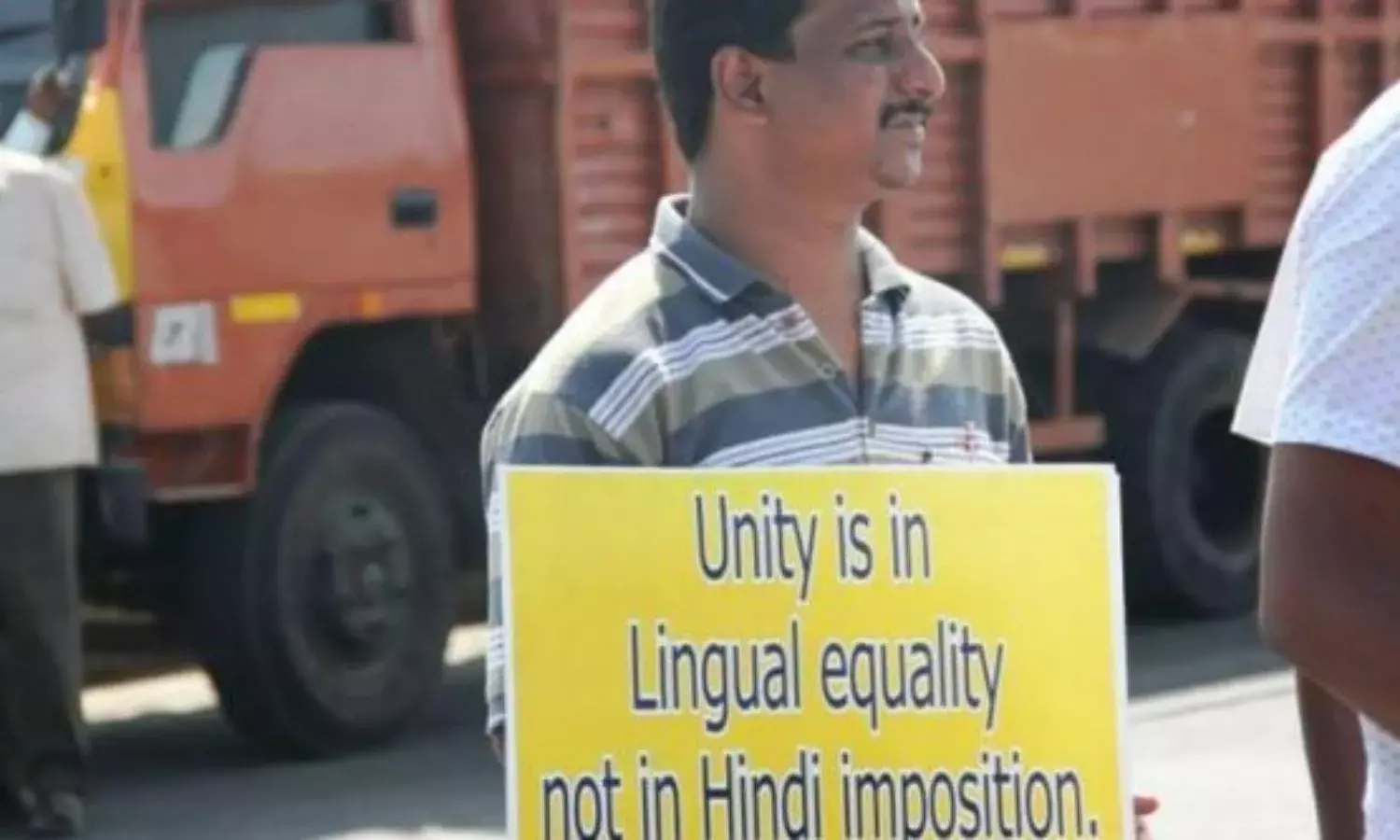‘Language is Identity’ - Row Over Hindi
Twitter storm

Social media has lately been abuzz with debates over what is India's national language. The controversy was fueled by a Twitter spat between Bollywood actor Ajay Devgn and Kannada actor Sudeep Kiccha.
Kiccha had said during an event, "Someone said that a pan India film was made in Kannada. I'd like to make a small correction. Hindi is no more a national language. They (Bollywood) are doing pan-India films today. They are struggling by dubbing in Telugu and Tamil, but not tasting success. Nowadays, we just make films that are going everywhere. Many decades ago Chinese started dubbing their movies into the English language and everybody accepted it. We are actually quite late. But I think today the way the film industry is going, it's beautiful. Languages were just barriers. Today, it has broken all the eyes. I think it is no more pan-India, it's just a film. Pan-India is coming from Mumbai here.”
Responding to his comment, Devgn tweeted in Hindi, "KicchaSudeep my brother, According to you if Hindi is not our national language then why do you release your mother tongue movies by dubbing them in Hindi? Hindi was, is and always will be our mother tongue and national language. Jan Gan Man."
Devgn's comments that Hindi is the national language drew sharp criticism from several South Indian actors, politicians and language activists. Former Karnataka Chief Minister HD Kumaraswamy and Siddaramaiah condemned the tweet.
The debate over what is India's national language is not new. Although the constitution has never declared Hindi as the national language and clearly defines Hindi in Devanagari script to be the 'official' language of the Union along with English under Article 343, many have made attempts in the past to call it or make it seem like the 'national' language. It was just last month that Home Minister Amit Shah, while presiding over a meeting of the Parliamentary Official Languages Committee said that Hindi should be accepted as an alternative to English and not other languages.
It is precisely this prejudice towards one language in a country with hundreds of languages, and attempts to make it sound more important than others that hurts the sentiments of other language-speaking communities.
Acclaimed pianist Anil Srinivasan said, "Languages are a symbol of our cultures. It is through language that we carry our cultures forward. We ought to learn as much as we can about other cultures. But plurality is important. We cannot impose a language on anybody. It should be a choice."
In Tamil Nadu, the anti-Hindi-imposition agitations began way back in 1937 when Hindi was made mandatory for classes VI to VIII. It is that struggle which united the people of the state like never before. People were ready to lay down their lives and did lay down their lives for the sake of Tamil.
But Tamilians have since then been accused of being too touchy about their mother tongue. What people who think so don't get is that the struggle is not about the language, it is a struggle against the attempt to subjugate and dominate over Tamils through the imposition of Hindi.
In his book Let There Be India, Babu K Verghese says, "Language, communication and human needs are closely connected. We communicate with one another to fulfill our human needs, social, economic, political, cultural and spiritual. Thus language is a barometer of the socio-economic planning of a country, and so vital to the holistic development of a nation."
He adds, "India never had a common language which was intelligible to the masses everywhere in the country. For many years, Sanskrit remained a common medium, but it was the language of the learned classes and not of the masses. The Mughal rulers imposed Pesian as the official language and English became a sort of lingua franca when the British came.
"At Independence, the constituent assembly could not arrive at a consensus in the choice of a national language [sic]. Therefore, the question was put to vote and Hindi won. However, in India, with 1652 languages, the concept of one national language itself is a matter of political expediency rather than of practical viability."
Dr D P Pattanaya, former Director of the Central Institute of Indian Languages says, "Language use in education which creates inequity, by restricting or denying the right of minority language groups even to exist, language use in administration that restricts or denies access to other language groups to effectively participate in the socio-economic developments and language use in mass communication which bestows the right to control and manipulate information and knowledge by the controlling elite threaten to destroy the very bass of multilingual, multiethnic and multicultural countries."
Another author and professor who has done extensive research into the origins of Tamil says requesting anonymity, "The moment language goes, people's identity will also disappear. Mother tongue has to be safeguarded."
He adds, "That's what happened in England in the 19th century. There were several local dialects and people wanted to unite the country using English. So they taught only English in schools. The local dialects slowly disappeared. Today there are only four dialects. Every year about 100 languages disappear, primarily in Latin America and Africa. People lose their identity along with the language."
"People derive meaning for themselves through language. It's a matter of heritage and pride. It's about identity. It is for communication. Language is the heart of a being. We have to safeguard it, otherwise you would lose everything."
"If you keep reading literature of a particular culture, you will eventually start behaving like them. Language has that power, that sort of mental and psychological effect. Why is there a craze to learn English? Because we want to be able to think like Westerners."



